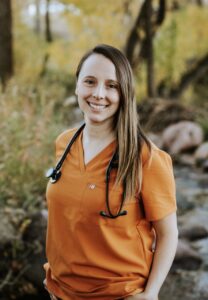By Morgan Shier
This essay was selected for publication as part of the War Prevention Initiative’s Feminist Foreign Policy Essay “Un-Contest”.
Her cane rested comfortably against the exam table, the joyful print of her button-down intensifying her sunken chest and pallor. Her son had passed away just a few months before her hospitalization for acute renal failure, and as I’ve intuited over my own journey of grief, sorrow left unprocessed makes its home in the kidneys.
I fidgeted with my ID badge. I felt partially responsible for her current state of weakness and depression. She desperately wanted to avoid the ER, having recently watched her son die in one, and I desperately wanted to be her old-timey country doctor who could fix anything. Against my better judgment, I coordinated her CT scan for the next morning and sent her home. She no-showed for her appointment. I called her but no answer. Was she ok?
Three days later, I received notification that she had been hospitalized. I agonized over every detail of her admission note, which mentioned me, her primary care physician, several times. Surely, the hospital staff must think I’m an idiot. Surely my patient will see me at fault, and word of my incompetence as a physician will spread. One thing is for sure—I am the best at beating myself up.
I am the mother of an eleven-month-old and a three-year-old. I am a wife. I am a daughter. And fourteen months ago, my eighty-one-year-old father disappeared without a trace and is still missing. Despite the support I receive from my family, friends, and community, I remain with the seemingly innate habit of seeing myself as inadequate and going to war with myself about what it means to be a “good” mother, wife, daughter, sister, and doctor. In the context of the broader global definition of these roles, what do I want to pass along to my children and my patients? Surely, it is that they know their inherent perfection, worth, and right to safety.
I greet my patient with a hello, how are you, knowing full well she’s been better.
I say to her, “I have read your hospital notes, and of course, I have questions, but in your own words, please tell me as much or as little as you would like about what happened.” I brace myself for the blame I’ve imagined she’s felt toward me this whole time.
Instead, she says, “I miss my son. There must have been something I could have done for him, and it’s all my fault.”
I hand her the box of tissues, which has become more critical than gauze in my practice, and we go down to the depths of her suffering together.
She tells me about her son’s depression. She tells me she should have recognized it and done something sooner. She tells me she should have loved him more. I reassured her that she did everything right and she did everything she could.
In my own life, I have grappled with this self-blame. I should have recognized my father’s depression about his stroke and aphasia. I should have taken him on more drives to the mountains. I should have searched for him harder. I should have been a better doctor and daughter.
I should have—the violent incantation of self-blame and punishment that is deeply ingrained in the human psyche due to its tendency to favor blame over anguish, motivating us to never make such a “mistake” again; otherwise, we may compromise our safety by becoming unlovable to others.
From birth, we are wired to seek a sense of safety, and it is a lack of general safety that necessarily contributes to a lifetime of self-blame, self-punishment, and avoidance of the darker aspects of our experience that we will inevitably be called to confront. What’s more terrifying is that in the rare moments we have allowed ourselves to go to the depths of a painful or ecstatic experience, we open ourselves up to the emotions of the collective human experience, and we can no longer deny our oneness. Resisting this call to cultivate a space of tenderness for ourselves and others in these moments drives us deeper into separation from one another. Uncompromising beliefs (on any end of a spectrum) solidify to obliterate any chance for seeds of inclusivity, growth, and change to take root.
My work often calls me to the depths of human experience, and in these moments (and any moment, really), it is my job to create a safe space for exploration. Some days this is challenging, especially if the exploration necessitates conversation about divisive topics that we may never agree upon as a society. Still, most days, there is a reward, as a deeply felt sense of safety creates a foundation for shared decision-making on that which we have in common: that deep love for our families, vocation, etc., which ultimately shapes our strong beliefs. Ironically, curiosity and the exploration of a variety of experiences, particularly the tender moments, tend to make any discomfort we experience trying to avoid them fade, which opens a channel for self-acceptance in its purest form.
Of course, my work is still to check vital signs and refill medications, but maybe my job, and everyone’s job, is to bring light into those darker parts of ourselves when we can. At some point, life will undoubtedly drag us to the underworld and lay us bare. And what happens when solving problems with violence (even in subtler forms such as habitual self-blame or burying our personal grief) fails us on an individual and global scale, as it does now? The only place left to go is within.
To be feminine is to be a creator, a task most certainly not exclusive to those assigned female at birth. To embody wholly this “feminine” aspect of our humanness is to create from a mental and physical space that is compassionate, loving, accepting, and, above all, safe. Foundational to any policy, whether it be personal or global, should be a clear recognition of our human multidimensionality, intersectionality, and interconnectedness; that is, true safety is only nurtured when holding with exquisite tenderness both our inner and outer worlds, recognizing that multiple aspects of our identity come together to create our unique experiences of oppression and that how I treat you is ultimately how I treat myself. In this recognition, safety finds its home, and our personal grief is experienced as profoundly universal. As Thich Nhat Hanh writes, “Understanding is love’s other name.”
Safety is only ever temporarily generated by militarization, an approach that almost certainly guarantees self-annihilation. Any action that is to result in meaningful and lasting peace must also be a form of “non-violent non-cooperation” (as coined by Gandhi) with the power structures that uphold endless war.
For me, this gentle refusal comes as frequent self-reminders to tenderly hold my own grief, which opens my heart naturally to the suffering of others. I also drink lots of water to protect my kidneys and feel hopeful that my actions have some rippling effect. Of vital importance is that my grief has been reciprocally held by my community, which is only possible when one’s community accepts them for who they are; unconditional love for all humanity is both the destination and the path.
In order to change the world outside ourselves, we must first recognize the war within and, with fierce gentleness, usher out the old patterns of internalized violence, domination, and force, opening the doors for new ways of being.
 Morgan Shier, MD, is a family medicine physician in rural Colorado. She sees patients of all ages and stages and is passionate about the social determinants of health. Photo by Danica Donnelly
Morgan Shier, MD, is a family medicine physician in rural Colorado. She sees patients of all ages and stages and is passionate about the social determinants of health. Photo by Danica Donnelly
Photo credit: Public Domain

